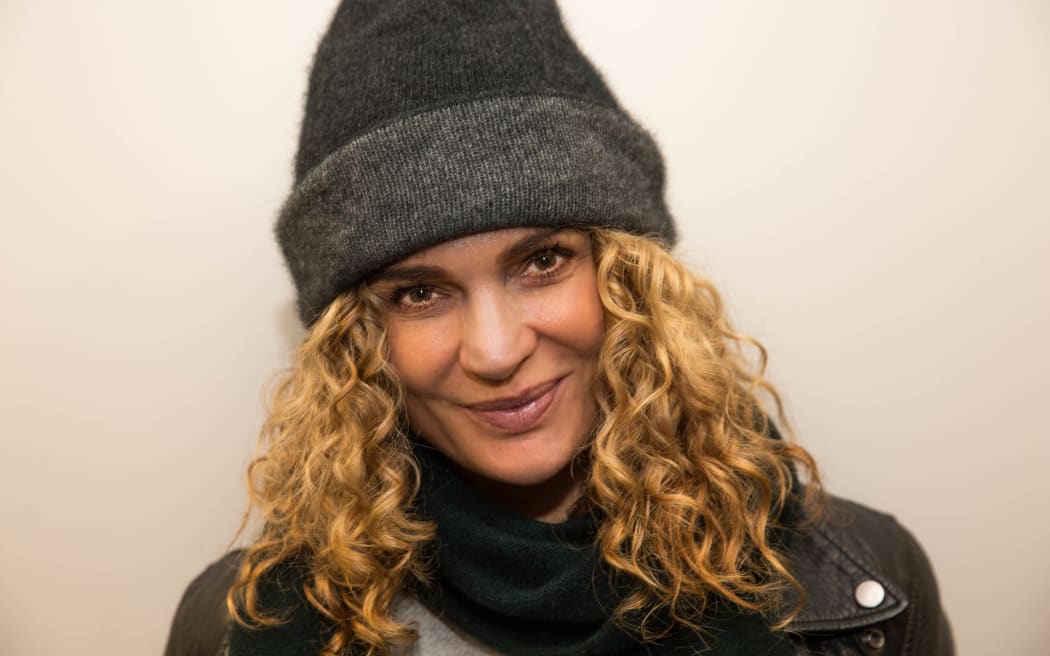
Danielle Cormack Photo: RNZ / Cole Eastham-Farrelly
New Zealand actress Danielle Cormack has forged a hugely succesful career on screen and stage, largely in Australia in recent years. She's about to return to TV here in season 4 of the acclaimed Australian prison drama Wentworth - where she plays Bea Smith, the prison's top dog.
She's also been in Rake, Underbelly: Razor, as well as numerous films, and continues to perform on stage for the Melbourne Theatre Company and Sydney Theatre Company, among others.
Last year she won a Logie award for most outstanding actress and most outstanding performace by a female actress at the Australian Subscription Television Industry awards.
Read an edited excerpt of their interview below:
You’ve been very affected by playing this role on Wentworth haven’t you? You’ve got involved with organisations working with young people in the fringes of the justice system or whose parents are in prison. Are you surprised how much the research for, and then playing this role got a grip on you?
I think more than anything it was a joy to have my perspective broadened. To understand that not everyone who ends up a part of the criminal justice system is a really bad bugger. There’s been a series of events and the circumstances surrounding primarily their childhood has had a really strong impact and defined the choices that they make as adults. Just to be a little bit more compassionate about that.
Of course that is not for everyone, there are some people who stand outside of that and they are beyond help, but there are some others, especially part of the youth justice system, that you can really hopefully capture these young minds and hearts before they continue along that path and help redirect them to make choices for their lives that are going to be better in the long run.
The brain and the nervous system can fail to distinguish between reality and fantasy. When you got so involved in this character, were you finding yourself with a lasting stress from it?
I was, that’s exactly it. It took me a while to really be truly cognitive about what was going on between my body and my brain. And to understand, once again, to look at neural pathways that were being formed and when I had to act a scene of utter grief or act in an incredibly violent scene, that in actual fact my body could not distinguish between whether it was true or not. It was registering as I was actually having that experience, and it took me a while to realise that I was being affected by the experience of shooting Wentworth, so I had to do something about that and I went and spoke to someone and found that I had to warm down at the end of the day.
Actors are told to warm up all of the time, but there’s not a lot of weight even in training to warm down from playing a role. At the end of every day I would have to debrief with myself and find my own body again. Just to leave the characters at the door.
You can never lose a sense of anticipation as a performer, either. Because otherwise you’re not going to draw the performance out of yourself. It’s something you literally do have to live with.
Well you live with it, but you also learn how to manage it and use what’s going on. The chemistry of your body and the energy of that and use it to move forward and enhance the performance, rather than restrict you. If you understand the chemistry of the body, the minute we get hit with that cortisol and adrenaline it shuts down everything apart from the parts of us that need to survive, and that’s what it’s about survival. Being an actor is all about survival!
What is it that drives this in you? When I look back over your career, the body of work is extraordinary, including work that is simultaneous. You had a pretty classic beginning... around 10 you were a storyteller... you were writing and performing plays, but not a lot of formal training early on was there, and then just this tremendously full career in all forms – stage, television and film. What was the energy that drove the output do you think?
From a very young age like you said I was writing and performing things. The desire to perform has always been there for me. I don’t remember thinking, ‘I would like to do that’, because I was always doing it.
And now, it must have been in the last couple of years, I’ve really regretted that I haven’t done any formal training. So I’ve gone back to training and I’ve signed up for every single masterclass and acting workshop that I am available for. I feel like I can never stop learning.
Even though I might be working on critically successful shows and win awards and everything, I still don’t feel like I have learned as much as I can. I don’t think you ever stop learning and I still feel like such a novice and I guess that is what keeps driving me as well. The investigation of human psychology is endlessly fascinating for me.

